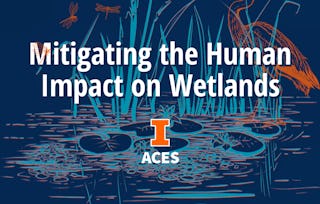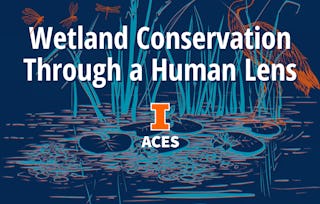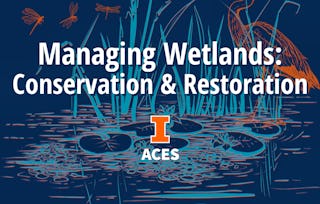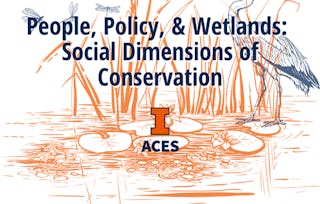This course explores wetland conservation through legal, ecological, and policy perspectives. Learners will examine the regulatory roles of federal, state, and local governments, with a focus on the Clean Water Act (CWA) and Waters of the United States (WOTUS). Global conservation efforts, including the Ramsar Convention, will be analyzed in relation to sustainability objectives. Through case studies, learners will assess factors shaping wetland management, the role of community participation, and adaptation to climate change. The course also evaluates engineering-based and hybrid solutions for enhancing wetland resilience. By the end, learners will develop a critical understanding of wetland conservation challenges and strategies in both U.S. and international contexts.
即将结束: 只需 199 美元(原价 399 美元)即可通过 Coursera Plus 学习新技能。立即节省

您将学到什么
Contrast federal, state, and local regulatory roles in wetland conservation, focusing on CWA and WOTUS.
Analyze international conservation laws and conventions, including Ramsar, and their link to sustainability.
Evaluate wetland management factors, community participation, and resilience strategies against climate change.
您将获得的技能
要了解的详细信息

添加到您的领英档案
6 项作业
了解顶级公司的员工如何掌握热门技能

积累特定领域的专业知识
- 向行业专家学习新概念
- 获得对主题或工具的基础理解
- 通过实践项目培养工作相关技能
- 获得可共享的职业证书

该课程共有4个模块
You will become familiar with the course, your classmates, and our learning environment. The orientation will also help you obtain the technical skills required for the course. Following the orientation, you will begin Module 1. This module explores the roles of federal, state, and local U.S. governments in wetland conservation, highlighting their distinct regulatory authorities. It traces the history of the Clean Water Act (CWA) and the evolution of the "Waters of the United States" (WOTUS) definition. Learners will gain an understanding of how federally regulated wetlands are identified and the legal frameworks guiding their protection.
涵盖的内容
12个视频7篇阅读材料2个作业1个讨论话题
This module examines the role of international law in advancing environmental conservation efforts. It explores the legal and ecological significance of key conservation conventions, with a particular focus on the Ramsar Convention on Wetlands. Learners will evaluate the successes and challenges of Ramsar in promoting wetland conservation worldwide, emphasizing its impact on biodiversity and sustainable development.
涵盖的内容
11个视频3篇阅读材料1个作业
This module explores the critical connection between wetland conservation and global sustainability objectives, such as climate resilience and biodiversity preservation. Learners will evaluate the diverse factors influencing wetland management across different ecological, cultural, and socio-economic contexts. Through case studies, the module contrasts the successes of wetland management initiatives, highlighting the role of community participation in achieving sustainable outcomes.
涵盖的内容
11个视频3篇阅读材料1个作业
This module focuses on the need for adaptive strategies in wetland management to address human pressures and the impacts of climate change. Learners will assess engineering-based and hybrid solutions designed to enhance wetland resilience in changing environments. Through case studies from various regions in the United States, the module provides a critical evaluation of innovative approaches to wetland adaptation and their effectiveness.
涵盖的内容
11个视频5篇阅读材料2个作业
获得职业证书
将此证书添加到您的 LinkedIn 个人资料、简历或履历中。在社交媒体和绩效考核中分享。
位教师

从 Environmental Science and Sustainability 浏览更多内容
 状态:免费试用
状态:免费试用University of Illinois Urbana-Champaign
 状态:免费试用
状态:免费试用University of Illinois Urbana-Champaign
 状态:免费试用
状态:免费试用University of Illinois Urbana-Champaign
 状态:免费试用
状态:免费试用University of Illinois Urbana-Champaign
人们为什么选择 Coursera 来帮助自己实现职业发展




常见问题
Yes! Although completion of the Coursera course alone is not credit-bearing, it is a required component of a graduate-level Canvas course that can be "stacked" toward advanced credentials such as an academic (transcriptable) graduate certificate or a degree. If you decide to pursue further education, the credits you earn from this course can be applied toward a formal academic program, provided that you meet all the requirements of admission to the certificate or degree. Learn more about the Wetland Science and Conservation Graduate Certificate.
To access the course materials, assignments and to earn a Certificate, you will need to purchase the Certificate experience when you enroll in a course. You can try a Free Trial instead, or apply for Financial Aid. The course may offer 'Full Course, No Certificate' instead. This option lets you see all course materials, submit required assessments, and get a final grade. This also means that you will not be able to purchase a Certificate experience.
When you enroll in the course, you get access to all of the courses in the Specialization, and you earn a certificate when you complete the work. Your electronic Certificate will be added to your Accomplishments page - from there, you can print your Certificate or add it to your LinkedIn profile.
更多问题
提供助学金,






